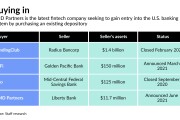
Liberty Bank, a small lender in Salt Lake City, says it's working on improving its standing after regulators again determined that it was in "substantial noncompliance" with the Community Reinvestment Act.
The Federal Deposit Insurance Corp. also said that it "identified an illegal credit practice" during its review of the bank's compliance with the CRA, a law that looks to ensure banks serve low- and moderate-income people in their area.
Liberty Bank's practices harmed a majority of its mortgage borrowers, the agency said in a report. The agency did not specify what the illegal practice was, but it said the bank violated a law that protects consumers against unfair or deceptive practices.
Kendall Phillips, the bank's president and CEO, said in an email that the $11.6 million-asset bank is "working with regulators, third-party auditors and consumers to complete corrective action for our mortgage customers."
"All policies and practices have been corrected to satisfy the deficiencies," Phillips said.
The FDIC wrote the report back in August 2022, but it didn't release the findings publicly until this week.
In the report, the FDIC said that Liberty had "not completed corrective action to address the violation" and had not committed to doing so. The agency also said the bank did not have sufficient policies and training in place "to prevent illegal credit practices."
The allegedly illegal practice did not harm the bank's CRA rating, which would have been at the lowest possible level regardless, "considering the bank's already substantially deficient performance," the agency said.
The bank had gotten a "substantial noncompliance" rating in its 2021 examination, and the latest exam makes it the first FDIC-supervised bank in nearly six years to receive a rock-bottom CRA rating twice in a row, according to FDIC data.
Regulators judge banks' compliance with the CRA partly by measuring their lending track records in "assessment areas" where they conduct business and take deposits.
All of Liberty Bank's loans during the examination period were made outside of its assessment area of Salt Lake County, where the bank's sole branch is located, the FDIC report shows.
The bank focuses on making loans for "tiny houses,"
Tiny homes and ADUs have been part of housing debates in Salt Lake City, where officials are working on a
The recent policy changes will mean Liberty Bank can make loans "for tiny homes in the bank's own backyard," Phillips said in an email.
"The bank is focused on affordable housing with the Tiny Home lending product and plans to help cure CRA with this and other strategies," Phillips said.
Back in 2021, Liberty Bank was part of a
CreditNinja's consumer loans all charge annual percentage rates above 36%, according to the company's website. High-cost loans have
Nonbanks that make such loans often partner with banks in Utah, where interest rate limits are relatively loose, and they make loans that critics say violate interest rate caps in other states.
An FDIC spokesperson said the application by CreditNinja's parent company to acquire Liberty Bank was withdrawn on July 1, 2021, some two weeks after it was announced. Bank-related merger applications are often withdrawn when a denial from regulators appears likely.
David Shorr, executive chairman of NinjaHoldings, said his company "exercised our right to terminate our purchase agreement and are no longer pursuing an acquisition of Liberty Bank."
"We are open to future acquisition opportunities," Shorr said in an email.
Phillips, the Liberty Bank CEO, said the bank is "currently seeking investors to strengthen its small size and is working with nationally recognized financial advisors and legal counsel."






